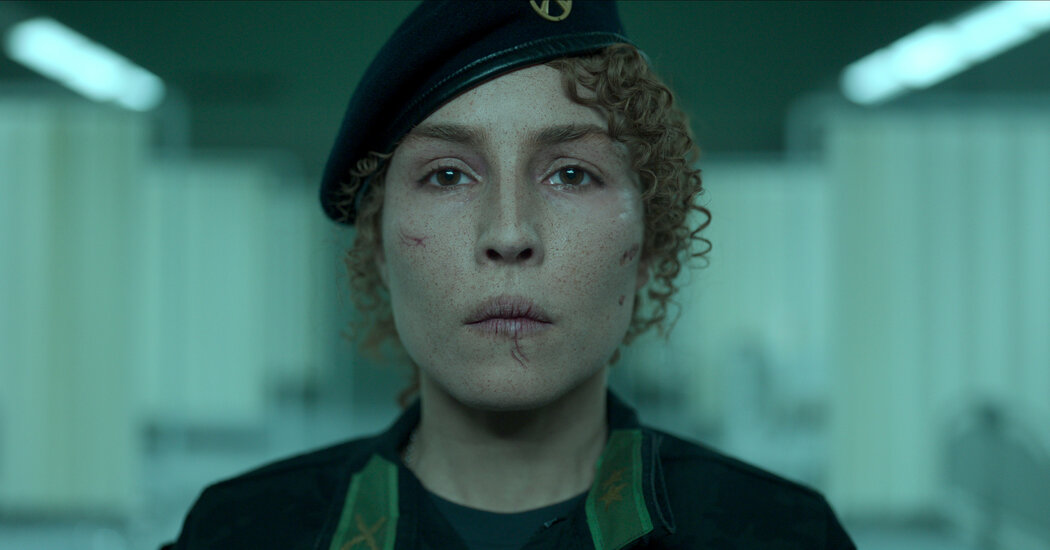
‘Black Crab’
For many fans, the girl with the dragon tattoo will always be Noomi Rapace. In the decade since she portrayed the Goth hacker Lisbeth Salander in a Swedish film trilogy, Rapace has built a thriving international career that leans heavily on thrillers and science fiction. Now, she is back in her native land with this war movie set in a dystopian future to which the conflict in Ukraine suddenly lends a tragic contemporary echo. Rapace’s Caroline Edh is a soldier so badass that she is asked to join a small unit tasked with ferrying supersecret, super important canisters — on ice skates. She agrees, but not because she is patriotic: Caroline has been told that a camp on the other side of the vast frozen expanse holds her daughter, who was abducted years earlier.
The plot is fairly basic, but the film benefits from two formidable assets. The first, of course, is Rapace, who can suggest steely determination like few others. The other is Adam Berg’s assured direction. All the scenes on the ice are absolutely superb — sometimes eerily beautiful and sometimes, well, chilling — and the sound design is so richly evocative that you might want to watch with headphones. Let’s hope Berg and Rapace team up again.
‘American Refugee’
This futuristic, or futuristic-ish, thriller has a pedigree singular enough to draw attention: The film is co-produced by Blumhouse, best known for its horror fare, and directed by Ali LeRoi, who created the sitcom “Everybody Hates Chris” with Chris Rock. Maybe that’s why “American Refugee” cannot quite make up its mind as to what story it wants to tell, or how.
But there is a big reason to watch anyway, and it’s Erika Alexander.
Still most famous as the star of the 1990s series “Living Single,” Alexander is an authoritative presence as Helen Taylor, an obstetrician. (Her job plays a key part in the plot.) Her marriage with Derek Luke’s Greg is going through a rocky patch, which is not helped by the United States crashing into catastrophic economic failure that in turn spirals into civil unrest.
As the country collapses (cue the obligatory montage of alarming news reports), the Taylors and their children must run away from home invaders. They find shelter of sorts in the compound of their prepper neighbor, Winter (Sam Trammell, not nearly menacing enough). From then on the movie pretty much abandons the whole financial-apocalypse setup to focus on single-location suspense.
As an action film, “American Refugee” comes up short. Where it is a lot more interesting is as a look at masculinity in a time of social meltdown, with a pair of men desperately trying to prove their worth as they feel threatened by the strength and autonomy of the women in their lives. Science fiction? Hardly.
‘Captain Nova’
With a future Earth a nearly uninhabitable wasteland, Nova (Anniek Pheifer) is sent back in time to stop the chain of events that will destroy the world. There is a glitch, though: Nova ends up 25 years younger after her trip so for most of the movie she is an intense, Greta Thunberg-like 12-year-old girl (Kika van de Vijver). With the help of her new friend Nas (Marouane Meftah), Nova sets up to change the course of history. While this Dutch family film about a pint-size eco-warrior does feature a cute little robot, its overall approach is fairly serious; this is not “Spy Kids vs. Climate Change.” (It figures that the Dutch version of the “Terminator” premise would be about an ecological apocalypse rather than a robot uprising.) It’s rather nice to have a children-appropriate story that does not sugarcoat its message, though parents might have to be ready for some heavy-duty post-viewing conversations. And that’s not a bad thing in our current circumstances.
‘The Blazing World’
Carlson Young’s debut feature is that rare film: the product of what feels like a personal, obsessive vision. You can see traces of Peter Strickland (“The Duke of Burgundy”) and Dario Argento in the bizarre world she conjures. Young herself plays Margaret Winter, a troubled young woman who never quite recovered from the death of her twin sister when they were little girls. Margaret feels as she doesn’t belong anywhere, least of all with her feuding parents (Dermot Mulroney and Vinessa Shaw). Eventually, she finds a purpose in a series of fantastical trials orchestrated by Lained (the singular German actor Udo Kier doing strangeness very, very well), who is the film’s answer to the Goblin King of “Labyrinth.”
Mixing up sci-fi, horror and fantasy, the film deals with overcoming trauma and growing up. It’s a fairly familiar subject, but “The Blazing World” has an idiosyncratic touch all its own, bolstered by ambitious production design and an evocative score by the Foster the People keyboardist Isom Innis.
‘Madelines’
The director Jason Richard Miller has a lot of fun with this low-budget, high-concept time-travel film, which is as gory as it is wacky. Funded by an avuncular patron (Richard Riehle), Madeline (Brea Grant) and Owen (Parry Shen) are building a time machine in their garage. Madeline decides to test their invention in person because she does not want to sacrifice another animal after a test mouse met a bloody end. (The film is barely past the 10-minute mark by then, because Miller has no interest in exposition or back story; this is refreshing.) Madeline inadvertently creates a loop that generates dozens and dozens of versions of herself, with one materializing in the garden every day at the same time. Because two versions of one person can’t coexist, Owen, using an array of inventive devices, must kill each new Madeline as soon as she pops up. The 1980s-style synth score has announced the comic tone from the start, and much of the film’s humor derives from the completely nonchalant way Madeline and Owen handle their predicament: Of course time travel is possible! Of course a guy has to kill his wife over and over! Of course the Madelines become murderous! Like a rambunctious lo-fi band, the film gets by on a devil-may-care energy that defies the viewer from taking anything too seriously.




